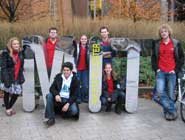Founded in 2006, this Centre for Doctoral Training (CDT) has already gained an outstanding reputation not only within Bristol but also internationally. The funding will ensure that BCCS continues on its upward trajectory. To date, BCCS achievements include the following:
- creating a hub of theoretical and computational expertise that connects a spectrum of application areas (spokes), each of which is linked to existing University research themes. Individual application areas drive theoretical and computational developments in the hub, which in turn feed back into other application areas in a virtuous circle. The theory hub consists of computer science, mathematics and statistics. The spokes are currently within biological sciences, engineering, social sciences and molecular sciences;
- attracting some of the brightest and best students in the UK who are highly motivated to carry out interdisciplinary research. Sixty different academics from 17 departments across four faculties have offered to teach BCCS students or supervise their projects. Industry offers BCCS students group projects. BCCS students receive training in 18 different fields (most of which they have never met before);
- establishing a system of peer mentoring whereby students in one discipline provide know-how to students in another. BCCS offers a broad range of modules, including the distinctive ‘Foundations of Complexity Sciences’ module, delivered by the Department of Philosophy.
BCCS students have already announced their presence on the international stage, forming the core of the BCCS Bristol team that won Best Model prize in 2008 and 2009 at the International Genetically Engineered Machine competition held at MIT, and carried off third prize overall in 2010. Another BCCS student, Chris Musselle, won Best Student Poster prize at the 2009 European Conference on Complex Systems held at Warwick University, and two others recently secured prestigious six-month Japan Society for the Promotion of Science (JSPS) Postdoctoral Fellowships.
BCCS students have acted as catalysts for a large number of new research collaborations that would not have occurred otherwise. The University research themes of Predictive Life Sciences and Exabyte Informatics have benefited greatly from the involvement of BCCS students. BCCS students also take part in a wide variety of public engagement activities. Owen Rackham, for example, has become an EPSRC NOISEmaker; NOISE (New Outlooks in Science and Engineering) provides a platform for early career researchers to engage with the general public about the research they do.
BCCS Director Professor John Hogan said: 'Since we accepted our first students in October 2007, we have established a novel, ambitious and transformative CDT. Our students have already had considerable impact both within Bristol and abroad. BCCS is a significant team effort. We believe that we are poised to deliver an outstanding group of postgraduates who have received a unique training across a broad range of disciplines, who feel naturally at home in an interdisciplinary environment and who can make contributions in many different fields. This further tranche of funding will ensure that this effort continues for several years to come.'
